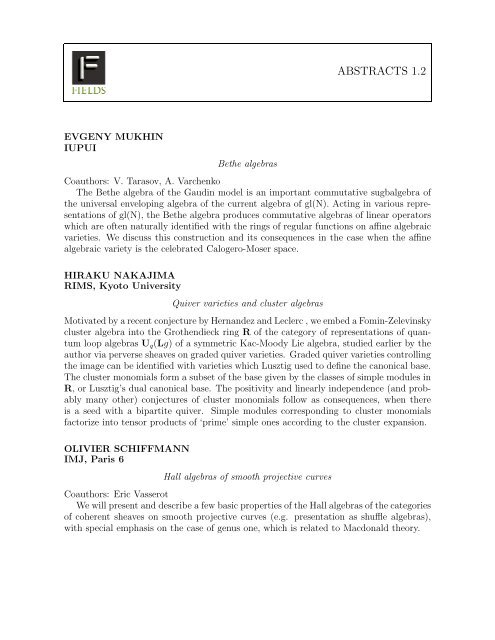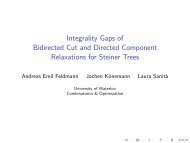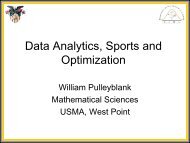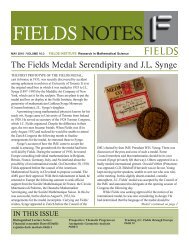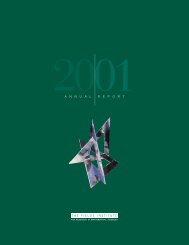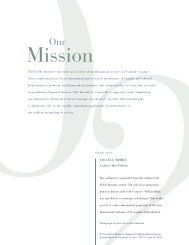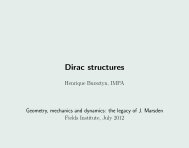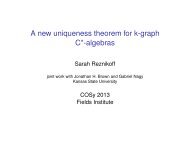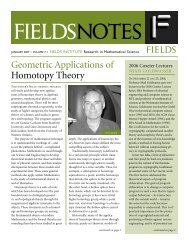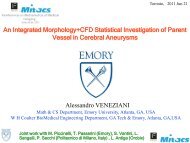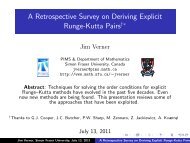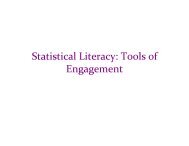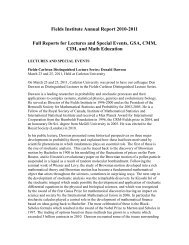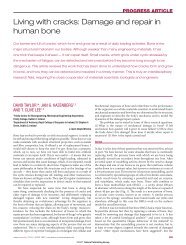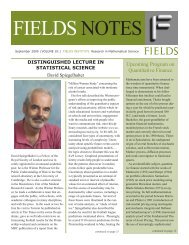ABSTRACTS 1.2 Invited Talks - Fields Institute - University of Toronto
ABSTRACTS 1.2 Invited Talks - Fields Institute - University of Toronto
ABSTRACTS 1.2 Invited Talks - Fields Institute - University of Toronto
You also want an ePaper? Increase the reach of your titles
YUMPU automatically turns print PDFs into web optimized ePapers that Google loves.
EVGENY MUKHIN<br />
IUPUI<br />
Bethe algebras<br />
<strong>ABSTRACTS</strong> <strong>1.2</strong><br />
Coauthors: V. Tarasov, A. Varchenko<br />
The Bethe algebra <strong>of</strong> the Gaudin model is an important commutative sugbalgebra <strong>of</strong><br />
the universal enveloping algebra <strong>of</strong> the current algebra <strong>of</strong> gl(N). Acting in various representations<br />
<strong>of</strong> gl(N), the Bethe algebra produces commutative algebras <strong>of</strong> linear operators<br />
which are <strong>of</strong>ten naturally identified with the rings <strong>of</strong> regular functions on affine algebraic<br />
varieties. We discuss this construction and its consequences in the case when the affine<br />
algebraic variety is the celebrated Calogero-Moser space.<br />
HIRAKU NAKAJIMA<br />
RIMS, Kyoto <strong>University</strong><br />
Quiver varieties and cluster algebras<br />
Motivated by a recent conjecture by Hernandez and Leclerc , we embed a Fomin-Zelevinsky<br />
cluster algebra into the Grothendieck ring R <strong>of</strong> the category <strong>of</strong> representations <strong>of</strong> quantum<br />
loop algebras Uq(Lg) <strong>of</strong> a symmetric Kac-Moody Lie algebra, studied earlier by the<br />
author via perverse sheaves on graded quiver varieties. Graded quiver varieties controlling<br />
the image can be identified with varieties which Lusztig used to define the canonical base.<br />
The cluster monomials form a subset <strong>of</strong> the base given by the classes <strong>of</strong> simple modules in<br />
R, or Lusztig’s dual canonical base. The positivity and linearly independence (and probably<br />
many other) conjectures <strong>of</strong> cluster monomials follow as consequences, when there<br />
is a seed with a bipartite quiver. Simple modules corresponding to cluster monomials<br />
factorize into tensor products <strong>of</strong> ‘prime’ simple ones according to the cluster expansion.<br />
OLIVIER SCHIFFMANN<br />
IMJ, Paris 6<br />
Hall algebras <strong>of</strong> smooth projective curves<br />
Coauthors: Eric Vasserot<br />
We will present and describe a few basic properties <strong>of</strong> the Hall algebras <strong>of</strong> the categories<br />
<strong>of</strong> coherent sheaves on smooth projective curves (e.g. presentation as shuffle algebras),<br />
with special emphasis on the case <strong>of</strong> genus one, which is related to Macdonald theory.


